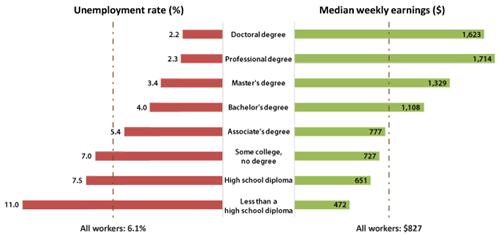- Everett Public Schools
- Graduation Resources
Graduation
Page Navigation
-
Graduation Resources
- Diploma vs. GED
- Graduation Resource Guide
- Need To Get Back In School?
- Everett Reengagement Academy (Graduation Alliance)
- Sequoia High School
- OnlineHS
- Port Gardner K-12
- Edmonds College
- Everett Community College
- Lake Washington Institute of Technology
- Shoreline Community College
- Free Online Programs
- Paid Online Programs
- Job Corps
- Washington Youth ChalleNGe Academy
- WorkSource Youth Center
- Graduation Toolkits
- Student Handbook
Diploma vs. GED
-
 vs.
vs.  For years the GED test has been known as an alternative to a high school diploma, but did you know there are some significant, and often life-impacting, differences between the two?The GED test is often referred to as a "general equivalency diploma," but the acronym GED was actually created by the American Council on Education to be used for tests of "general education development."The GED was created in 1942 for the U.S. military to test World War II veterans in reading, writing, math, science and social studies. Many of these veterans were deployed when they would normally have been completing their high school diplomas. The GED allowed returning soldiers the ability to apply for a job or enroll in college without having to go back and finish high school.How Can A Diploma Affect Your Future?
For years the GED test has been known as an alternative to a high school diploma, but did you know there are some significant, and often life-impacting, differences between the two?The GED test is often referred to as a "general equivalency diploma," but the acronym GED was actually created by the American Council on Education to be used for tests of "general education development."The GED was created in 1942 for the U.S. military to test World War II veterans in reading, writing, math, science and social studies. Many of these veterans were deployed when they would normally have been completing their high school diplomas. The GED allowed returning soldiers the ability to apply for a job or enroll in college without having to go back and finish high school.How Can A Diploma Affect Your Future?- According to the Bureau of Labor Statistics, high school graduates earn an average of $1,600 more per month than those with a GED!
- Less than 5% of those with a GED receive a bachelor's degree, while 33% of those with diplomas do.
- Studies show that high school graduates are more prepared for college and score higher on placement tests than those with GED's. In fact, the American Council of Education says 77% of GED holders do not continue past the first semester of college.
- The military not only limits the number of GED holders accepted, they require higher scores on aptitude tests for those with a GED than those with a diploma. The military service dropout rate for high school graduates is only 24%, compared to 45% for GED holders.
 Source: U.S. Bureau of Labor Statistics, Current Population SurveyDid you know...?A study done by the National Bureau of Economic Research showed that while GED holders and graduates can have equivalent abilities to learn, those with the GED were found to be deficient in noncognitive skills, such as persistence, motivation, and reliability. Surveyed employers were afraid that whatever traits lead employees to drop out of high school will lead them to other irresponsible behaviors in the work place.
Source: U.S. Bureau of Labor Statistics, Current Population SurveyDid you know...?A study done by the National Bureau of Economic Research showed that while GED holders and graduates can have equivalent abilities to learn, those with the GED were found to be deficient in noncognitive skills, such as persistence, motivation, and reliability. Surveyed employers were afraid that whatever traits lead employees to drop out of high school will lead them to other irresponsible behaviors in the work place.

